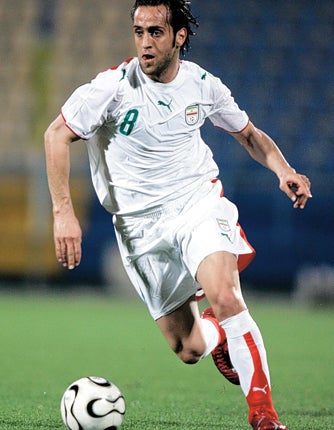Ramadan, and its obligation to fast from dawn until dusk, can be a testing time for all Muslims, but for professional sports people the holy month can be especially fraught.
While some Western coaches baulk at the idea that their well-paid stars may be under-fuelled during matches, others demand that their players observe the fast.
Yesterday, Ali Karimi, an Iranian footballer known as the "Maradona of Asia", was fired by his club for failing to fast. Tehran-based Steel Azin FC, which announced the dismissal on its website, claims Karimi, who was named the Asian Player of the Year in 2004, and played in the German Bundesliga for two years with Bayern Munich, "insulted officials of the [Iranian] football federation and the Tehran team's supervisor who confronted him on the issue".
Karimi is the second most capped player and the third highest scorer for the Iranian national team.
Ramadan, the ninth month of the Islamic calendar, is the religion's month of fasting in which participating Muslims refrain from eating, drinking and sexual activities from dawn until sunset. Fasting is intended to teach Muslims about patience and spirituality. It is also a time for Muslims to offer more prayer than usual.
The fasting dilemma is particularly acute for Muslim cricketers who, if a match falls during Ramadan, might have to exert themselves batting or bowling for seven hours with nothing to eat or drink. England's third Test against Pakistan begins on Wednesday, a week into the fast.
Muslim cricketers will often not fast during matches and make up the days missed after Eid ul-Fitr, the day of celebration at the end of Ramadan.
To prepare for the fasting, Muslims wake up before dawn and the Fajr prayer to eat a meal. Muslims break their fast at Maghrib (sunset) prayer time with a meal called Iftar. Muslims may continue to eat and drink after the sun has set until the next morning's prayer call. Ramadan is a time of reflecting , believing and worshiping God. Muslims are expected to put more effort into following the teachings of Islam and to avoid obscene and irreligious sights and sounds. The act of fasting is said to redirect the heart away from worldly activities, its purpose being to cleanse the inner soul and free it from harm. It also teaches Muslims self-discipline, self-control, sacrifice, and empathy for those who are less fortunate; thus encouraging actions of generosity and charity.
"A player's decision to fast is between himself and God," the Pakistan cricket team manager Yawar Saeed said. "We don't get involved in this matter. We don't mix sport and religion. It is up to the individual concerned."
The challenges of playing sport during Ramadan are expected to surface at the 2012 London Olympics, which falls in the middle of the holy month. As many as 3,000 athletes at the Olympics will be Muslim and the coincidence was seen as an embarrassment for Lord Coe, who sold the Games as an opportunity to unite Britain's ethnic communities.
In Germany the football authorities and Muslim groups agreed that failing to eat would affect performance and therefore income. It is a precedent that won't help Karimi, who has now lost his principal source of income.
The discussions between Germany's Central Council of Muslims and the football authorities in Berlin last month followed a dispute between the Bundesliga club FSV Frankfurt, who formally warned three of their players for fasting last year.
Jose Mourinho, manager of Real Madrid, was criticised while manager of Inter Milan, after he claimed a Muslim player in his team should not have been fasting during Ramadan. He substituted Sulley Muntari half an hour into a match and later claimed that his lack of energy was down to his fasting.
Fasting sportsmen:
Freddie Kanouté
The former Tottenham striker plays for Sevilla, and his coaches are trying to formulate a hydration and nutrition plan to help him withstand the Spanish heat. "I try to respect my faith and follow it as best I can," says Kanouté, who also gives to charity during the Holy Month. He says there is "no conflict because people who know about Islam, they know fasting empowers and does not weaken the Muslim".
Hakeem Olajuwon
During an 18-year career in basketball, Houston Rockets centre Hakeem Olajuwon was known for waking before dawn during Ramadan to eat exactly seven dates and drink a gallon of water. He would then fast until sunset, refusing to drink even while training. "When I break the fast at sunset, the taste of water is so precious," he said.
Christian Negouai
In 2003, Kevin Keegan claimed his Manchester City striker Christian Negouai had been forced to break the Ramadan fast by drinking water in order to provide a urine sample for a drugs test. UK Sport disputed this, saying that its enforcement officer would have been prepared to wait until after sunset for the sample.
Husain Abdullah
Last week, the American football player Husain Abdullah declared he would be fasting during Ramadan, while continuing to train for the opening of the NFL season next month. The Minnesota Vikings player said: "I'm putting nothing before God, nothing before my religion. This is something I choose to do, not something I have to do. So I'm always going to fast."
Subscribe to Independent Premium to bookmark this article
Want to bookmark your favourite articles and stories to read or reference later? Start your Independent Premium subscription today.


Join our commenting forum
Join thought-provoking conversations, follow other Independent readers and see their replies